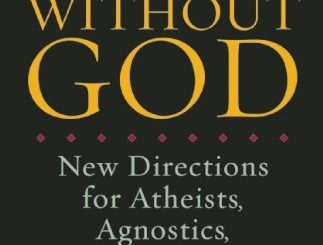Why I became an Atheist 07 – Bad reasons for belief (Part IV)
NOTE: This post is part of a series in which I am blogging my way through John Loftus’ book Why I Became an Atheist: A Former Preacher Rejects Christianity.
 In Part I, Part II, and Part III of this mini-series, I covered the lists of bad reasons for both belief and disbelief from John Loftus’ book. In this post, I’d like to complete the discussion of my own list of bad reasons for belief.
In Part I, Part II, and Part III of this mini-series, I covered the lists of bad reasons for both belief and disbelief from John Loftus’ book. In this post, I’d like to complete the discussion of my own list of bad reasons for belief.
My list of bad reasons to believe include:
- Guilt manipulation by preachers
- Fear of punishment
- Choosing the default belief of one’s family or culture
- Secondary benefits of religion like community, education, child training, or social and business contacts
- Reaction to abusive secular, atheist, or religious parents or leaders
- A response to a near death experience or trauma
- Believing the first good argument you hear
- Experiencing awe and reverence at creation
Let’s continue discussing the last four items.
5. Reaction to abusive secular, atheist, or religious parents or leaders
One of the things I like about John is that he admits that we all have emotional, non-rational motivations in making metaphysical choices – we’re not just rational machines. So after admitting such, how do we keep those conscious or unconscious biases and emotional needs/reactions from skewing our decision making process?
When I worked as a cancer researcher, something my boss said with regard to bias really stuck with me. He said:
All data means something. It might not mean what we want it to mean, but it means something. All scientists have biases. The good ones know how to design their experiments so that their biases can’t skew their gathering or interpretation of results.
Just admitting and being aware that we can not and are not entirely objective is half the battle (like an addict, we have to first admit we have a problem!). Knowing this, we should ask ourselves:
- Have I had a bad experience with a certain world view? That may skew my evaluation.
- Does my experience represent the actual teachings of that view, or a botched version of it? In it’s best form, what does it look like?
- Have I read works by its best defenders and representatives?
- Am I willing to be convinced in either direction? Why or why not?
Every persistent ideology or value system has some inherent value or truth, otherwise, it would not persist. However, it certainly can be perverted, and often is by fallible, selfish humans. We need to ignore the hypocrites and liars, and look beyond them to the actual ideas and evaluate them in light of reason and practical experience. Knee-jerk reactions to our experiences can cause us to make erroneous conclusions.
6. A response to near death or trauma
As I mentioned in Part II, some people make emotional commitments to God, for instance, after a brush with death. One of the most famous was the Reformer Martin Luther, who became a monk after being sorely frightened in a lightning storm.
The event which radically changed the course of Luther’s life took place near Stotterheim on July 2, 1505. The happy go lucky law student was altered into a humble monk searching for God’s grace. Luther had recently completed a Master’s degree and started his law studies at the University of Erfurt. He was on his way back to Erfurt after having visited his parents when he was caught in a terrible thunder storm a few hours outside of Erfurt. Lightning struck near him and he was thrown to the ground by the air pressure it created. At this moment he called to Saint Anne: “I will become a monk!”
Interestingly, though Luther believed that God existed and was committed to his religion, Luther was actually not a true Christian at that time, by his own admission, until his Tower Experience 14 years later:
Meanwhile in that same year, 1519, I had begun interpreting the Psalms once again. I felt confident that I was now more experienced, since I had dealt in university courses with St. Paul’s Letters to the Romans, to the Galatians, and the Letter to the Hebrews. I had conceived a burning desire to understand what Paul meant in his Letter to the Romans, but thus far there had stood in my way, not the cold blood around my heart, but that one word which is in chapter one: “The justice of God is revealed in it.” I hated that word, “justice of God,” which, by the use and custom of all my teachers, I had been taught to understand philosophically as referring to formal or active justice, as they call it, i.e., that justice by which God is just and by which he punishes sinners and the unjust.
But I, blameless monk that I was, felt that before God I was a sinner with an extremely troubled conscience. I couldn’t be sure that God was appeased by my satisfaction. I did not love, no, rather I hated the just God who punishes sinners. In silence, if I did not blaspheme, then certainly I grumbled vehemently and got angry at God. I said, “Isn’t it enough that we miserable sinners, lost for all eternity because of original sin, are oppressed by every kind of calamity through the Ten Commandments? Why does God heap sorrow upon sorrow through the Gospel and through the Gospel threaten us with his justice and his wrath?” This was how I was raging with wild and disturbed conscience. I constantly badgered St. Paul about that spot in Romans 1 and anxiously wanted to know what he meant.
I meditated night and day on those words until at last, by the mercy of God, I paid attention to their context: “The justice of God is revealed in it, as it is written: ‘The just person lives by faith.'” I began to understand that in this verse the justice of God is that by which the just person lives by a gift of God, that is by faith. I began to understand that this verse means that the justice of God is revealed through the Gospel, but it is a passive justice, i.e. that by which the merciful God justifies us by faith, as it is written: “The just person lives by faith.” All at once I felt that I had been born again and entered into paradise itself through open gates. Immediately I saw the whole of Scripture in a different light.
~ Preface to the Complete Edition of Luther’s Latin Works (1545) by Dr. Martin Luther, 1483-1546 Translated by Bro. Andrew Thornton, OSB
Some important points here. First, a commitment to a new world view does not mean that we understand what we are committed to. Our sudden identification with faith or atheism as a reaction to trauma or near death experiences does not mean that we’ve thought through or understood what we’ve done. We may have done little more than REJECT our previous world view.
Second, even if that preliminary commitment to a new view turns out to be correct once we’ve actually understood what it is we’ve committed to, with understanding may come a genuine conversion, not just a deepened commitment to a worldview we poorly understood. In Luther’s case, his idea of faith was incorrect even though he was committed to it.
7. Believing the first good argument you hear
Let’s face it, there are smart and persuasive people on all sides of the faith/unbelief argument. There are also sloppy loudmouths on both sides.
But if the tradition we’ve been raised with is an inferior version of it, when we hear an articulate person from the other side present their case, they may seem much more persuasive than normal because the case we have for our starting worldview is defective. Making a hasty decision before hearing someone of your current worldview present their case is probably unwise. As scripture says:
The first one to plead his cause seems right, until his neighbor comes and examines him. (Proverbs 18:17)
Let’s make sure we get the best arguments from proponents on both sides, not just the propaganda from one side – and if you are only reading authors who favor your position, you can bet some or all of it is skewed rather than objective, i.e. propaganda!
8. Experiencing awe and reverence at creation
Actually, I am of two minds about this piece of evidence. Most atheist try to explain this awe without referring to a creator, but as I mentioned in the previous post, I find this perspective a bit of a stretch. The Bible does say that the evidence of creation is enough so that we can not just believe, but KNOW that God exists, no faith necessary. It’s direct evidence.
For the wrath of God is revealed from heaven against all ungodliness and unrighteousness of men, who suppress the truth in unrighteousness, because what may be known of God is manifest in them, for God has shown it to them. For since the creation of the world His invisible attributes are clearly seen, being understood by the things that are made, even His eternal power and Godhead, so that they are without excuse. (Romans 1:18-20)
CONCLUSION
John Loftus’ book presents a good introduction to the idea that there are bad reasons to both believe and disbelieve in God, and we should be introspective about our own reasons. Of course, John will go on to define his worthy reasons for unbelief, and we will follow him on his journey.



